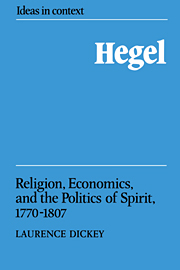Book contents
- Frontmatter
- Contents
- Preface
- Acknowledgments
- Introduction: Hegel in a Protestant cultural context
- Part I Hegel's Württemberg: “Civil Millenarianism” and the two faces of Protestant civil piety
- Part II Württemberg's Hegel: Applied theology and social analysis
- Part III Toward the Phenomenology: Sittlichkeit becomes a problem in social and political theory
- 5 Hegel discovers the economy
- 6 Sittlichkeit reconsidered: I. The essay on Natural Law
- 7 Sittlichkeit reconsidered: II. The essay on Ethical Life
- 8 Hegel's conception of the division of labor
- Epilogue: Bildung and politics: The “first class,” Christian pride, and “absolute spirit”
- Abbreviations
- Notes
- Index
7 - Sittlichkeit reconsidered: II. The essay on Ethical Life
Published online by Cambridge University Press: 11 January 2010
- Frontmatter
- Contents
- Preface
- Acknowledgments
- Introduction: Hegel in a Protestant cultural context
- Part I Hegel's Württemberg: “Civil Millenarianism” and the two faces of Protestant civil piety
- Part II Württemberg's Hegel: Applied theology and social analysis
- Part III Toward the Phenomenology: Sittlichkeit becomes a problem in social and political theory
- 5 Hegel discovers the economy
- 6 Sittlichkeit reconsidered: I. The essay on Natural Law
- 7 Sittlichkeit reconsidered: II. The essay on Ethical Life
- 8 Hegel's conception of the division of labor
- Epilogue: Bildung and politics: The “first class,” Christian pride, and “absolute spirit”
- Abbreviations
- Notes
- Index
Summary
Hegel's System der Sittlichkeit (System of Ethical Life) was written as a companion piece to the essay on Natural Law. Though not published during his lifetime, the essay is best regarded as a position paper in which Hegel fleshes out in more detail the practical political problem he had encountered and perfunctorily discussed in the Natural Law text, namely, how Tapferkeit could be set up as a conceptual axis that would allow for the conversion of the “inorganic” moment of Sittlichkeit into the “organic” one. Since it is clear from the Natural Law text that Hegel associated the organic with the political moment of objective experience, the essay on Ethical Life must surely on that account be considered one of Hegel's most pointedly political tracts.
Still, the political intentions of the essay are not immediately obvious. Even though the text addresses many of the same political problems as the essay on Natural Law, the political dimension of the text has been obscured by the language Hegel used to talk about it. We know, of course, that politics was very much on Hegel's mind when he wrote Ethical Life. There is an obvious political overlap between that text on the one hand and the essays on Natural Law and the German Constitution on the other. Yet, even though the essay on Ethical Life offers a detailed explanation of the “political moment” in human experience, it does so in a philosophical language that not only complicates an already complicated subject matter but also makes it impossible for the text to speak for itself.
- Type
- Chapter
- Information
- HegelReligion, Economics, and the Politics of Spirit, 1770–1807, pp. 231 - 252Publisher: Cambridge University PressPrint publication year: 1987



